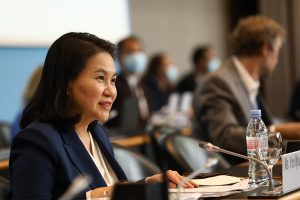This June, South Korea nominated its Trade Minister Yoo Myung-hee to run for director general of the World Trade Organization (WTO). Now one of two semifinalists, Yoo is running against former Finance Minister Ngozi Okonjo-Iweala of Nigeria, to succeed Brazil’s Roberto Azevedo, who stepped down as the WTO’s leader in August. Yoo is facing an uphill contest, with the EU and Japan reportedly backing Okonjo-Iweala.
But the WTO will seek to forge a consensus. In doing so, active U.S. support is critical for a candidate who has demonstrated an ability to forge a stronger commitment by the two largest global economies and traders, the United States and China, to a rules-based international trading system, which is essential for the prosperity of the U.S, and the global community.
Throughout her career, Yoo has gained a strong reputation for being organized, a consensus builder, and a tough negotiator capable of balancing competing interests in a field — and a nation — dominated by men. In March 2019, the center-left President Moon Jae-in selected her to be the first female minister of trade. Yoo’s history working with both the United States and China, 25 years of experience in politics and diplomacy, and personal background as a South Korean national make her the most favorable candidate to advance American interests.
Yoo Myung-hee has convincingly presented herself as a fair mediator on the global stage. She is a bridge candidate, who can speak to the United States and China, as well as to both developed and developing nations. As the chief negotiator for Korea, Yoo was involved in finalizing the South Korea-China free trade agreement negotiations in 2014, and renegotiating the South Korea-United States (KORUS) FTA in 2018. She received her Juris Doctor (JD) from Vanderbilt University Law School in 2002, and was admitted to the New York State Bar in 2003. Given her professional record, Yoo would treat American interests fairly, while also delegitimizing fomenting discontent about pro-U.S. bias.
Yoo’s quarter century of experience equipped her with an understanding to most effectively deal with three main functions of the WTO that need reform – negotiations, dispute settlement, and rules setting. On her website, she asserts that as director general she will address the organization’s trust deficit and countries’ questions regarding its modern relevance. “First and foremost, the WTO needs to keep evolving to become more relevant to the changing economic realities in the 21st century,” she writes. Its “negotiating function must be revitalized so as to bring much-needed updates to the rulebook. Another priority would be to restore the effective functioning of the dispute settlement mechanism.”
During a webcast event in July hosted by the think tank Chatham House, United States Trade Representative Robert Lighthizer argued that progress toward multilateralism had been sacrificed in favor of bilateralism. In response, Yoo disclosed that her country’s pursuit of bilateral deals reflected the breakdown in the WTO’s multilateral negotiating function, which she vowed to resurrect. While Yoo has proven herself to be reliable, methodological, and faithful to the rule of law, she also understands where the WTO falls short in its current form and is committed to making changes.
Lastly, Yoo’s background as a South Korean – a country that is truly a responsible stakeholder in the international liberal system – will steer Chinese influence toward that end. As the second largest financial donor to the WTO, China occupies one of the four deputy director-general positions.
Yoo’s election as the next director general of the WTO would allow the U.S. to acknowledge the importance of another Asian nation (aside from China) in the international economy and cease treating China as the only significant voice in Asia. And if Yoo is selected, Yi Xiaozhun could actually lose his seat as a deputy director general of the WTO in the name of regional balance considerations; this would go far in constructively channeling China’s influence in the WTO.
Thomas Byrne is president and CEO of The Korea Society.

































